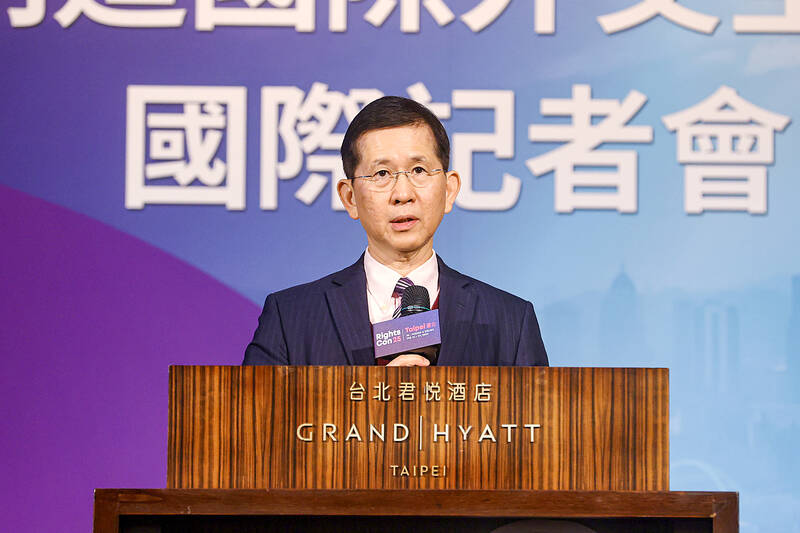Taiwan would pursue alternatives that are expected to become operational in the next two to three years to replace Space Exploration Technologies Corp and OneWeb telecommunication satellites should a change become necessary, Minister of Digital Affairs Huang Yen-nun (黃彥男) said yesterday.
Huang made the remarks in an interview with Yahoo TV online talk show host Wang Shi-chi (王時齊), who asked if Taiwan’s dependence on foreign telecom satellite groups capable of shutting down service for geopolitical reasons undermined the goal of building a resilient telecom infrastructure.
Huang said that Elon Musk’s Starlink and the Eutelsat OneWeb currently dominate the low Earth orbit satellite constellation business.

Photo: CNA
Taiwan’s emergency telecom system utilizes the latter following official negotiations, he said.
However, Canadian companies and Amazon’s Project Kuiper are developing similar systems, which are likely to be operational in two to three years as investors pour funds into the sector, he said.
Taiwan Space Agency is also developing domestic satellite systems, he added.
The government is not putting all its eggs in one basket and the nation’s telecom infrastructure would utilize different auxiliary systems to boost bandwidth if the project goes according to plan, he said.
Asked about recent incidents of undersea cables linking Taiwan to its outlying islands and the world being severed, Huang said the high frequency of mishaps in the past three months was suspicious.
Chunghwa Telecom and the Ocean Affairs Council reacted quickly on Tuesday when the Taiwan-Penghu No. 3 cable was snapped, enabling the coast guard to detain the ship suspected of sabotage, he said.
As an island nation, Taiwan depends on undersea cables to communicate with the outside world, and the ministry is working to mitigate this vulnerability by increasing its repair capabilities and laying down more cables, he said.
The ministry is facilitating efforts to improve technology to allow cables to be buried deeper and plans to harden cable landing points, he said.
Taiwan proper can maintain its communications with Matsu, despite losing all two cables because they are in the microwave transmission range and nine satellite ground stations have been built since the incident, he said.
The main island, Penghu and Kinmen remain connected via the Taiwan-Penghu No. 2, Penghu-Kinmen No. 3 and Taiwan-Kinmen No. 2 cables, he said.
However, the massive budget cuts by the opposition-led legislature have severely impacted the ministry’s project to build 773 emergency satellite ground stations, as the funding would only allow for 195 to be operated and maintained, Huang said.
Meanwhile, the ban on public employees using DeepSeek was implemented after internal tests showed that the Chinese artificial intelligence (AI) app failed to meet cybersecurity standards, he said.
The government would not interfere with the public’s use of the Chinese AI without being granted the authority via legislation, Huang said.

POSITIVE DEVELOPMENT: Japan and the US are expected to hold in-depth discussions on Taiwan-related issues during the meeting next month, Japanese sources said The holding of a Japan-US leaders’ meeting ahead of US President Donald Trump’s visit to China is positive news for Taiwan, former Japan-Taiwan Exchange Association representative Hiroyasu Izumi said yesterday. After the Liberal Democratic Party’s landslide victory in Japan’s House of Representatives election, Japanese Prime Minister Sanae Takaichi is scheduled to visit the US next month, where she is to meet with Trump ahead of the US president’s planned visit to China from March 31 to April 2 for a meeting with Chinese President Xi Jinping (習近平). Japan and the US are expected to hold in-depth discussions on Taiwan-related issues during the

‘LIKE-MINDED PARTNER’: Tako van Popta said it would be inappropriate to delay signing the deal with Taiwan because of China, adding he would promote the issue Canadian senators have stressed Taiwan’s importance for international trade and expressed enthusiasm for ensuring the Taiwan-Canada trade cooperation framework agreement is implemented this year. Representative to Canada Harry Tseng (曾厚仁) in an interview with the Central News Agency (CNA) said he was increasingly uneasy about Ottawa’s delays in signing the agreement, especially as Ottawa has warmed toward Beijing. There are “no negotiations left. Not only [is it] initialed, we have three versions of the text ready: English, French and Mandarin,” Tseng said. “That tells you how close we are to the final signature.” Tseng said that he hoped Canadian Prime Minister Mark Carney

President William Lai (賴清德) yesterday bestowed one of Taiwan’s highest honors on Saint Vincent and the Grenadines (SVG) Ambassador Andrea Clare Bowman in recognition of her contributions to bilateral ties. “By conferring the Order of Brilliant Star with Grand Cordon on Ambassador Bowman today, I want to sincerely thank her, on behalf of the Taiwanese people, for her outstanding contribution to deepening diplomatic ties between Taiwan and SVG,” Lai said at a ceremony held at the Presidential Office in Taipei. He noted that Bowman became SVG’s first ambassador to Taiwan in 2019 and

A man walks past elementary school artworks at the Taipei Lantern Festival in Ximen District yesterday, the first day of the event. The festival is to run from 5pm to 10pm through March 15.